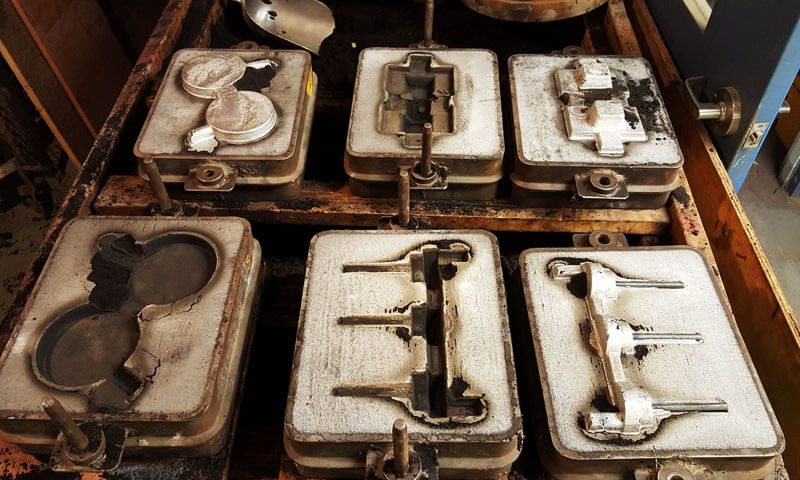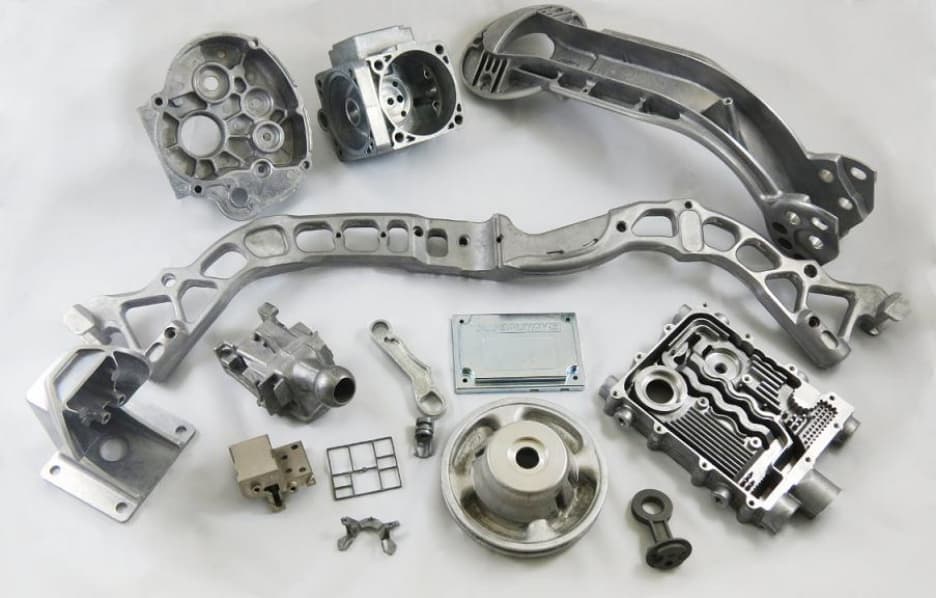Recognizing the Manufacturing Refine and Upkeep Practices for Light Weight Aluminum Shop Products
The production process for light weight aluminum factory products is complex and needs an extensive understanding of multiple stages. From the melting of aluminum at high temperatures to various casting methods, each action plays an important function. In addition, upkeep methods ensure equipment continues to be reliable and products are free from defects. The intricacies of these processes and their impact on item top quality raising essential questions regarding finest practices and innovative techniques in the sector.
Overview of Light Weight Aluminum Foundry Products
Light weight aluminum foundry items are vital parts in different markets, providing a blend of light-weight stamina and corrosion resistance. These products are commonly utilized in markets such as auto, aerospace, and building, where sturdiness and efficiency are extremely important. Aluminum's low density makes it an ideal product for applications calling for minimized weight without sacrificing architectural stability. The flexibility of light weight aluminum allows for the development of intricate geometries, dealing with diverse layout requirements.
Moreover, aluminum foundry products can be customized with numerous alloys to enhance certain buildings, such as improved thermal conductivity or enhanced hardness. Their resistance to oxidation and rust warranties long life, making them appropriate for both interior and outdoor applications. The combination of these qualities contributes to the growing preference for aluminum in contemporary manufacturing. As markets look for to enhance efficiency and sustainability, aluminum shop items remain to play a critical role in fulfilling these needs.
Thawing Refine: Changing Light Weight Aluminum
The melting procedure is an essential action in the production of light weight aluminum shop products, as it changes solid aluminum right into a liquified state appropriate for spreading. This procedure typically takes place in a heater, where scrap aluminum or ingots are heated to temperature levels around 660 levels Celsius. The choice of heater-- be it electrical, gas, or induction-- affects the effectiveness and cost of melting.
Throughout melting, cautious factor to consider is offered to the elimination of pollutants, such as oxides and various other contaminants, which can adversely affect the quality of the last product. Fluxes might be included in help in this purification procedure, improving the fluidity of the molten metal.
On top of that, temperature level control is important to ensure uniformity and protect against overheating, which can bring about oxidation. The melting process not only prepares aluminum for casting yet also plays a significant role in determining the honesty and residential properties of the last shop items.
Casting Strategies in Light Weight Aluminum Factory
Various spreading strategies are utilized in light weight aluminum shops to produce high-quality elements, each suited to various applications and specifications. Amongst one of the most frequently utilized techniques are sand casting, die casting, and investment casting. Sand casting uses a blend of sand and binder to develop mold and mildews, permitting for intricate shapes and large parts (Aluminum Casting). Die casting, identified by the high-pressure shot of liquified light weight aluminum right into steel mold and mildews, produces accurate and repeatable parts, perfect for mass production. Investment casting, or lost-wax casting, includes developing a wax version that is covered in a ceramic shell, making it possible for fine information and complex styles. Each technique has its benefits; sand spreading is affordable for low-volume manufacturing, while die spreading supplies performance for high-volume runs. Investment spreading is preferred for components requiring outstanding precision and surface finish. Choosing the proper technique depends upon factors such as production volume, component intricacy, and material properties
Completing Processes for Light Weight Aluminum Components
After casting strategies have actually shaped the light weight aluminum parts, finishing procedures play a substantial duty in improving their functionality and visual appeal. These processes typically include machining, surface area therapy, and finishing applications. Machining includes precise elimination of product to attain wanted measurements and surface area top quality. This is essential for guaranteeing that components fit effortlessly right into their designated applications.
Surface area therapies, such as anodizing and sprucing up, are utilized to boost corrosion resistance and improve visual attributes. Casting Foundry. Anodizing, particularly, offers a protective oxide layer, making the light weight aluminum a lot more try this web-site long lasting and visually enticing

Upkeep Practices for Long Life
Executing routine maintenance methods is crucial for ensuring the longevity of aluminum foundry products. Regular examinations should be conducted to determine wear and tear, as very early discovery can protect against pricey repairs and extend the lifespan of elements. Cleansing devices and equipment routinely lessens the danger of contamination, which can negatively affect item top quality. Lubrication of relocating components is also essential, as it reduces rubbing and wear, improving operational efficiency.
In addition, the application of a precautionary maintenance schedule helps in systematically addressing possible problems before they rise (aluminum casting company). This includes checking for leaks, making certain appropriate placement, and adjusting machinery. Team training on appropriate handling and upkeep techniques promotes a society of treatment, which is vital for sustaining item honesty. Documenting upkeep activities offers valuable understandings into efficiency trends, permitting for informed decision-making concerning future upkeep techniques.
Quality Assurance and Testing in Aluminum Shop Production
Quality assurance and testing are critical in light weight aluminum foundry manufacturing, as they assure that final items meet specified requirements and client assumptions. This process begins with resources inspection, making sure that light weight aluminum alloys follow called for structures. Throughout the manufacturing cycle, in-process evaluations are performed to keep an eye on criteria like temperature, product, and stress flow.
Numerous tests-- such as dimensional checks, aesthetic inspections, and non-destructive testing-- are performed to determine any type of flaws when casting is total. Mechanical buildings, including tensile toughness and solidity, are examined through standardized testing methods.
Furthermore, adherence to industry standards, such as ISO and ASTM, is critical for ensuring check here item top quality. Analytical process control techniques are usually utilized to analyze production information and facilitate continual renovation. By carrying out extensive quality assurance steps, aluminum shops can improve product integrity and lessen waste, eventually resulting in better client contentment and operational efficiency.
Often Asked Questions
What Are the Ecological Effects of Light Weight Aluminum Factory Operations?
Light weight aluminum foundry procedures can lead to substantial environmental influences, including air pollution from discharges, water contamination from waste discharge, and energy usage contributing to greenhouse gas exhausts, ultimately influencing local ecosystems and neighborhood health.
How Do Light Weight Aluminum Costs Influence Foundry Manufacturing Decisions?
Light weight aluminum rates considerably influence factory manufacturing choices; higher prices may lead to lower outcome or increased performance measures, while lower prices can encourage enhanced manufacturing and financial investment in brand-new technologies to boost competitiveness and success.
What Safety And Security Measures Are Necessary in Aluminum Foundries?
Vital safety and security actions in aluminum factories consist of safety other equipment, proper ventilation to minimize inhalation of fumes, normal tools upkeep, training on emergency situation procedures, and adherence to safety and security protocols to stop accidents and injuries amongst employees.
Can Light Weight Aluminum Be Recycled, and Just How Is It Processed?
Aluminum can indeed be recycled. The procedure includes collection, melting, and reforming the material into new products, significantly minimizing power intake and ecological impact compared to main light weight aluminum production while maintaining worldly quality.
What Are Typical Defects in Light Weight Aluminum Spreading and Their Reasons?

The manufacturing procedure for aluminum foundry items is complex and calls for an extensive understanding of multiple phases. Aluminum factory products are important elements in different markets, offering a mix of lightweight toughness and rust resistance. The melting process is a basic action in the manufacturing of aluminum factory products, as it changes solid light weight aluminum into a liquified state ideal for casting. Applying regular upkeep practices is crucial for ensuring the durability of aluminum factory items. Quality control and testing are extremely important in aluminum shop production, as they ensure that last products fulfill specified requirements and customer assumptions.